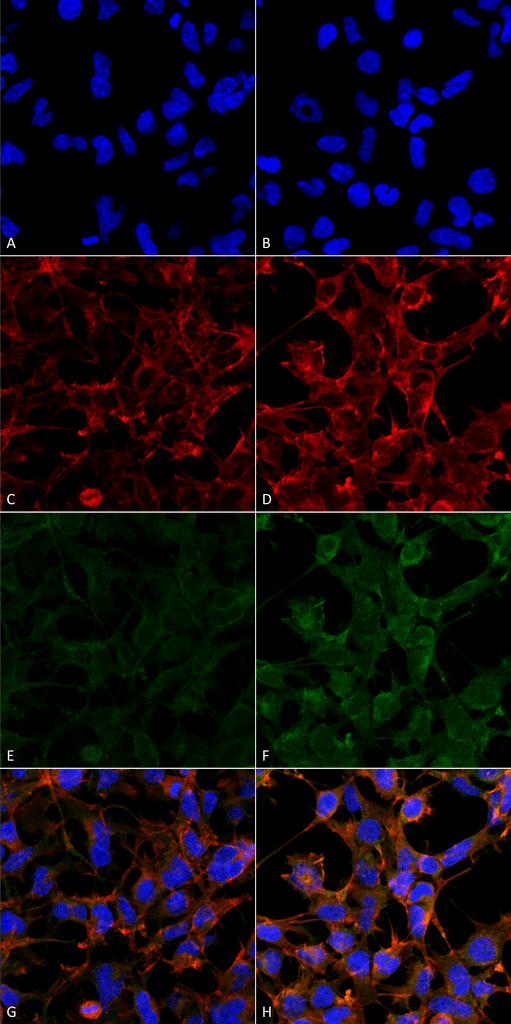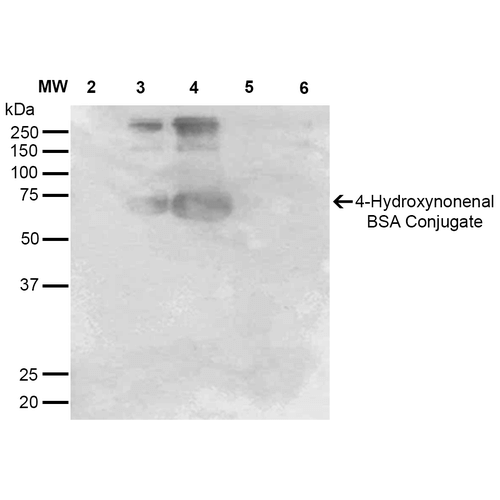SMC-511D-BI
Scientist.com Supplier
MOLECULAR SIGNATURE® 4-Hydroxynonenal Antibody, Clone 12F7: Biotin
Stressmarq Biosciences
Image

Image

DESCRIPTION
Mouse Anti-4-Hydroxynonenal (4-HNE) Monoclonal IgG1
DETAILS
- Target: 4-Hydroxynonenal
- Isotype: IgG1
- Conjugate: Biotin
- Immunogen: Synthetic 4-Hydroxynonenal modified Keyhole Limpet Hemocyanin (KLH).
- References: 1. Peterson, D., Doorn, J. (2004) Free Radic Biol Med. 37(7):937-945.
- Specificity: Specific for 4-Hydroxynonenal (4-HNE) modified proteins. Does not detect free 4-Hydroxynonenal. Does not cross-react with 4-Hydroxy-2-hexenal, Acrolein, Crotonaldehyde, Hexanoyl Lysine, Malondialdehyde, or Methylglyoxal modified proteins.
- Applications: WB | ICC/IF | ELISA
- Clone Number: 12F7
- Field of Use: Not for use in humans. Not for use in diagnostics or therapeutics. For in vitro research use only.
- Host Species: Mouse
- Product Type: Monoclonal
- Purification: Protein G Purified
- Concentration: 1 mg/ml
- Research Areas: Cancer | Oxidative Stress | Lipid peroxidation
- Storage Buffer: PBS pH 7.4, 50% glycerol, 0.09% Sodium azide *Storage buffer may change when conjugated
- Alternative Names: 4-Hydroxynonenal Antibody, 4-Hydroxy Nonenal (4-HNE) Antibody, 4-Hydroxy Nonenal Antibody, 4-HNE Antibody, 4-hydroxy Hexenal Antibody, HNE Antibody, 4-hydroxy-2-nonenal Antibody
- Antibody Dilution: WB (1:1000); ICC/IF (1:50); ELISA (1:1000); optimal dilutions for assays should be determined by the user.
- Cite This Product: StressMarq Biosciences Cat# SMC-511D-BI, RRID: AB_2702848
- Storage Temperature: Conjugated antibodies should be stored according to the product label
- Shipping Temperature: Blue Ice or 4ºC
- Scientific Background: 4-Hydroxy-2-nonenol (4-HNE) is an unsaturated aldehyde derived from lipid peroxidation. 4-HNE is an electrophile and reacts with protein nucleophiles such as cysteine, histine, and lysine (1). Low levels of 4-HNE promote cell survival via cellular antioxidant induction whereas higher levels lead to autophagy, apoptosis, and ultimately necrosis. 4-HNE has been linked to Alzheimer's disease, Parkinson's disease, cancer, cardiovascular diseases, diabetes, and liver disease.
- Certificate of Analysis: A 1:1000 dilution of SMC-511 was sufficient for detection of 4-Hydroxynonenal in 0.5 µg of 4-Hydroxynonenal conjugated to BSA by ECL immunoblot analysis using Goat Anti-Mouse IgG:HRP as the secondary Antibody.
- Species Reactivity Full Name: Species Independent